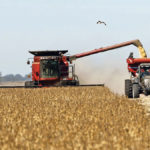HILLSBORO, North Dakota – Farmer Ken Lougheed raised a skeptical eyebrow when shown a pro-Central America Free Trade Agreement button being handed out by a hog farmers group in Iowa.
“That wouldn’t work too well here,” said Lougheed, a member of the North Dakota Farm Bureau, a general farm organization.
None of his three farmer colleagues seemed any keener to promote opening the border to other nations’ agricultural products, seeing in this and other free trade agreements more risk than reward. For all that the Central American deal might protect access for U.S. wheat exports, it also threatens the eastern North Dakota sugar beet industry, which would face more imports.
Read Also

U.S. market can’t easily be replaced
The deputy chief economist of Farm Credit Canada says 92 per cent of Canada’s total exports to the U.S. went into the country duty-free in June.
Their cynicism was no less evident for the Canada-United States free trade agreement, which has resulted in greatly increased trade between the two countries.
“Drive Interstate 20 on a Sunday afternoon and just look at all the Canadian trucks,” said one of the farmers in a none-too-positive way.
While U.S. presidents and many congressional representatives have promoted free trade agreements for the past 20 years, the political battles are always contentious.
The farm states express their economic self interest worries and hold a suspicion of foreign nations and farmers.
It’s been enough to make the present Central American deal far from a sure thing.
And even though Canada has won a string of victories against U.S. trade actions in agriculture over the past decade, many North Dakota farmers show no signs of losing interest in launching new attacks.
“We feel the majority of those (losses of complaints against the Canadian Wheat Board) were what we call academic exercises as opposed to full-fledged legal challenges,” said North Dakota Wheat Commission trade analyst Judge Barth in a meeting with the Manitoba Farm Writers and Broadcasters Association.
His organization has spent millions of dollars in its present complaint against Canadian exports of wheat and durum, which has resulted in hefty tariffs on Canadian grain. But the group doesn’t regret the decision.
“We’re confident the tariffs will remain in place,” said Barth. The commission estimates the tariffs on Canadian wheat have jacked up North Dakota wheat prices by 15-20 cents per bushel.
During last month’s World Pork Expo in Des Moines, Iowa, there was little public talk about the recent trade defeat for the National Pork Producers Council. It was able to win temporary duties imposed on Canadian hog imports before suffering a 5-0 ruling against it by the U.S. International Trade Commission.
But many American sow barn operators were still grumbling about Canadian pigs, and Tom Samp, who manages Canadian weanling purchases for a network of independent Iowa hog barns, said he is convinced another trade attack is just a matter of time.
“Oh, it’ll happen again during the next low (price phase of the hog cycle,)” said Samp during the Expo.
The U.S. pork council officials didn’t back away from their assertions that Canadian hogs are subsidized and that Canada operates illegal farm support programs.
The same lingering, simmering suspicions were evident in the North Dakota Farm Bureau farmers’ views on BSE.
One said that the border-opening issue should be settled by “sound science” that included the “precautionary principle,” which he said meant that the border should stay closed for the foreseeable future.
The farmers mentioned rumours they had heard that ruminant remains were still being fed to ruminants in Canada.
Barth said North Dakota farmers are annoyed by seeing Canadian trucks selling grain into the U.S. system, but see barriers to U.S. wheat being sold into Canada because of the variety identification system and other factors.
“We hear that an awful lot from producers,” said Barth.
He said farmers in his state want an end to the wheat board monopoly, which they blame for driving down durum prices in North Dakota and reducing acreage.
The wheat commission, just like the pork council and some American cattle producer groups, claims it isn’t against fair trade. In fact, the wheat commission supports the Central American deal.
It said it only wants to change the wheat board so that American farmers are not hurt by what it sees as unfair trading practices.
“Steps toward meaningful reform of the wheat board I think would appease some of the producers’ concerns and complaints,” said Barth.
But with American wheat producer organizations launching attacks on Canadian wheat, and American beef producers launching attacks on Canadian cattle, and American hog producers launching attacks on Canadian hogs, it’s clear that the suspicion is still flowing.















